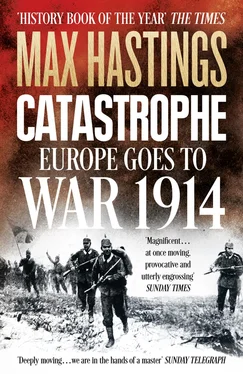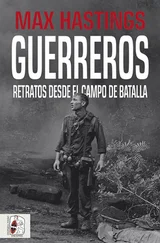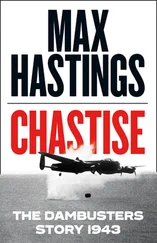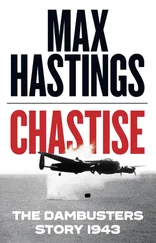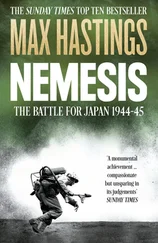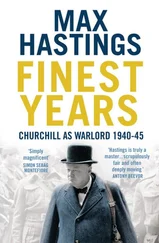The young man drew and raised his pistol, then fired twice. Another conspirator, Mihajlo Pucará, kicked a detective who saw what was happening and sought to intervene. Sophie and Franz Ferdinand were both hit from a range of a few feet. She immediately slumped in death, while he muttered, ‘Sophie, Sophie, don’t die – stay alive for our children.’ Those were his last words: he expired soon after 11 a.m. Princip was seized by the crowd. Pucará, a strikingly handsome young man who had rejected an offered role at Belgrade’s National Theatre in favour of a career in terrorism, grappled with an officer who tried to attack Princip with his sabre. Another young man, Ferdinand Behr, also did his best to save the assassin from retribution.
The plot to kill the Archduke was absurdly amateurish, and succeeded only because of the failure of the Austrian authorities to adopt elementary precautions in a hostile environment. This in turn raises the question: did the killing really represent the best effort of Apis, the arch-conspirator, or merely an almost casual, anarchic sideswipe at Hapsburg rule? No conclusive answer is possible, but the investigating judge at Sarajevo District Court, Leo Pfeffer, thought on his first glimpse of Princip that ‘it was difficult to imagine that so frail-looking an individual could have committed so serious a deed’. The young assassin was at pains to explain that he had not intended to kill the Duchess as well as the Archduke: ‘a bullet does not go precisely where one wishes’. Indeed, it is astonishing that even at close range Princip’s pistol killed two people with two shots – handgun wounds are frequently non-fatal.
In the first forty-eight hours after the killings, more than two hundred leading Serbs in Bosnia were arrested and taken to join Princip and čabrinović in the military prison. Several peasants were hanged out of hand. Within days all the conspirators were in custody except a Muslim carpenter, Mehmed Mehmedbašić, who escaped to Montenegro. By the end of July 5,000 Serbs had been jailed, of whom about 150 were hanged when hostilities subsequently began. Auxiliaries of the Austrian Schutzkorps militia exacted summary vengeance from many more Muslims and Croats. At the trial which began in October, Princip, čabrinović and Grabež were sentenced to twenty years’ imprisonment – as minors, they escaped capital punishment. Three others received jail terms, while five were hanged on 3 February 1915, and four more accessories received terms from three years to life. Nine of the accused were freed, including some peasants whom Princip said he had forced to help him.
Word of the deaths of the Archduke and his wife swept across the Empire that day, and thereafter across Europe. At Vienna’s Aspern airfield, the band was playing a new tune, ‘The Airmen’s March’, in the midst of a flying display when at 3 p.m. the proceedings were abruptly terminated on receiving the tidings from Sarajevo. The Emperor Franz Joseph was at Ischl when his adjutant-general Graf von Paar brought him news of the murders. He received it with no visible emotion, but decided to eat his dinner alone.
The Kaiser was attending Kiel Regatta. A launch approached the royal yacht, which Wilhelm attempted to wave away. Instead it closed in, carrying Georg von Müller, chief of the Kaiser’s naval cabinet. The admiral placed a note in his cigarette case and threw it up to the Hohenzollern ’s deck, where a sailor caught it and carried it to the Emperor. Wilhelm took the case, read its message, turned pale and murmured: ‘Everything has to start again!’ The Kaiser was among the few men in Europe who personally liked Franz Ferdinand; he had lavished emotional capital on their relationship, and was genuinely grieved by his passing. He gave orders to abandon the regatta. Rear-Admiral Albert Hopman, chief of the Imperial Naval Office’s central staff, was also at Kiel, just leaving a lunch at which the British ambassador had been a fellow guest, when he heard a report that Franz Ferdinand had ‘died suddenly’. At nightfall, having learned the exact circumstances, he wrote of ‘a dreadful act of which the political consequences are incalculable’.
But most of Europe received the news with equanimity, because acts of terrorism were so familiar. In St Petersburg, British correspondent Arthur Ransome’s Russian friends dismissed the assassinations as ‘a characteristic bit of Balkan savagery’, as did most people in London. In Paris another journalist, Raymond Recouly of Le Figaro , recorded a general view that ‘the crisis in progress would soon recede into the category of Balkan squabbles, such as recurred every fifteen or twenty years, and were sorted out among the Balkan peoples themselves, without any of the great powers needing to become entangled’. President Raymond Poincaré was at Longchamps races, where reports of the shots in Sarajevo did not impede his enjoyment of the running of the Grand Prix. Two days later in a Prussian school, twelve-year-old Elfriede Kuhr and her classmates peered at newspaper photographs of the assassin and his victim. ‘Princip is better-looking than that fat pig Franz Ferdinand,’ she observed mischievously, though her classmates deplored her flippancy.
The Archduke’s funeral service, in the stifling heat of the Hofburgpfarrkirch, lasted just fifteen minutes, following which Franz Joseph resumed his cure at Ischl. The old Emperor made little pretence of sorrow about his nephew’s death, though he was full of rage about its manner. Most of his subjects shared his sentiments, or lack of them. On 29 June in Vienna, Professor Josef Redlich noted in his diary: ‘there is no sense of grief in the town. Music has been playing everywhere.’ The London Times reported the funeral on 1 July in terms measured to the point of somnolence. Its Vienna correspondent asserted that ‘so far as the press is concerned, there is a remarkable absence of any inclination that revenge should be taken upon the Serbs of the Monarchy as a whole for the misdeeds of what is believed to be a small minority … With regard to Serbia also the utterances of the press are on the whole remarkably restrained.’
Foreign observers expressed surprise that Viennese mourning for the heir to the imperial throne was perfunctory and patently insincere. It was thus ironic that the Hapsburg government scarcely hesitated before taking a decision to exploit the assassinations as a justification for invading Serbia, even at the cost of provoking an armed collision with Russia. And Princip had killed the one man in the Empire committed to avert this.
Конец ознакомительного фрагмента.
Текст предоставлен ООО «ЛитРес».
Прочитайте эту книгу целиком, купив полную легальную версию на ЛитРес.
Безопасно оплатить книгу можно банковской картой Visa, MasterCard, Maestro, со счета мобильного телефона, с платежного терминала, в салоне МТС или Связной, через PayPal, WebMoney, Яндекс.Деньги, QIWI Кошелек, бонусными картами или другим удобным Вам способом.
